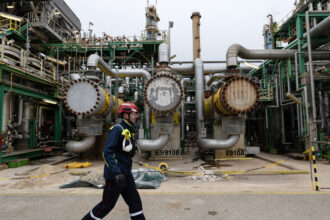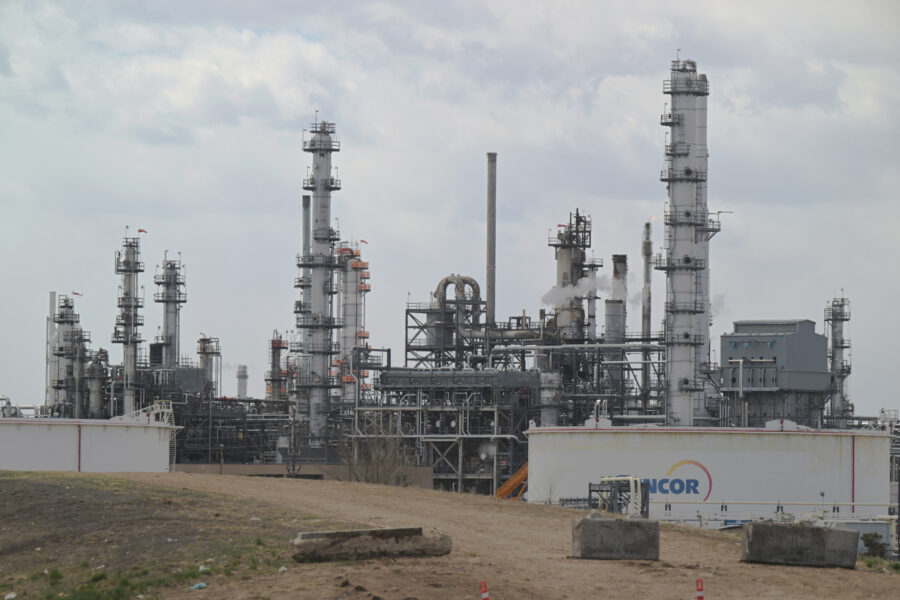The builder of the controversial Dakota Access pipeline was told by federal regulators Thursday that it cannot resume construction on new sections of its other major project, the troubled Rover gas pipeline in Ohio, following a massive spill and a series of violations.
In mid-April, Energy Transfer Partners spilled several million gallons of thick construction mud into some of Ohio’s highest-quality wetlands, smothering vegetation and aquatic wildlife in an area that helps filter water between farmland and nearby waterways.
New data reveals the amount of mud released may be more than double the initial estimate of about 2 million gallons. Fully restoring the wetlands could take decades, Ohio environmental officials have said.
Officials at the Federal Energy Regulatory Commission (FERC) ordered Energy Transfer Partners to halt construction there on May 10.
At the time, FERC told the company it could continue work at the rest of its construction sites, but it could not start new operations. The order identified eight future work locations to be temporarily off limits.
Energy Transfer Partners quickly informed FERC that construction had, in fact, already started at two of the sites on the list ahead of the order. The company asked to be allowed to continue work at the Captina Creek location in eastern Ohio and the Middle Island Creek site in northwestern West Virginia, arguing that immediately halting work would increase the risk of spill or other environmental impacts there.

According to the company’s letter to federal regulators, “any remedial action to withdraw and then re-disturb the [Captina Creek] area at a later date will greatly increase the likelihood of a release from surface erosion into the creek.” Energy Transfer Partners also noted that if work stopped in West Virginia, a drilling hole could collapse and the company would risk losing some of its drilling equipment.
FERC was not swayed. On May 25, regulators told Energy Transfer Partners that the work sites would remain barred after their own assessment showed the construction zones were stable.
The estimated $4.2 billion Rover project is being built to transport gas from processing plants in West Virginia, Pennsylvania and eastern Ohio across parallel pipes to a delivery hub in northwestern Ohio.
More than 100 local and environmental groups have urged FERC to immediately halt all construction on the line “to ensure the safety of communities along the pipeline route.” Activists are also fighting Rover and other fossil fuel infrastructure projects on climate change grounds because the new installations can have a lifespan of 50 years or more, locking in new carbon emissions over the long term.
About This Story
Perhaps you noticed: This story, like all the news we publish, is free to read. That’s because Inside Climate News is a 501c3 nonprofit organization. We do not charge a subscription fee, lock our news behind a paywall, or clutter our website with ads. We make our news on climate and the environment freely available to you and anyone who wants it.
That’s not all. We also share our news for free with scores of other media organizations around the country. Many of them can’t afford to do environmental journalism of their own. We’ve built bureaus from coast to coast to report local stories, collaborate with local newsrooms and co-publish articles so that this vital work is shared as widely as possible.
Two of us launched ICN in 2007. Six years later we earned a Pulitzer Prize for National Reporting, and now we run the oldest and largest dedicated climate newsroom in the nation. We tell the story in all its complexity. We hold polluters accountable. We expose environmental injustice. We debunk misinformation. We scrutinize solutions and inspire action.
Donations from readers like you fund every aspect of what we do. If you don’t already, will you support our ongoing work, our reporting on the biggest crisis facing our planet, and help us reach even more readers in more places?
Please take a moment to make a tax-deductible donation. Every one of them makes a difference.
Thank you,












